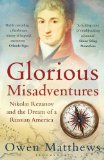Summary | Excerpt | Reviews | Beyond the book | Read-Alikes | Genres & Themes | Author Bio

From the book jacket: At sixteen, Edward Beauclerk Maurice impulsively signed up with the Hudson's Bay Company -- the Company of Gentleman Adventurers -- and was sent to an isolated trading post in the Canadian Arctic, where there was no telephone or radio and only one ship arrived each year. But the Inuit people who traded there taught him how to track polar bears, build igloos, and survive expeditions in ferocious winter storms. He learned their language and became so immersed in their culture and way of life that children thought he was Inuit himself. When an epidemic struck, Maurice treated the sick using a simple first aid kit, and after a number of the hunters died, he had to start hunting himself, often with women, who soon began to compete for his affections. The young man who in England had never been alone with a woman other than his mother and sisters had come of age in the Arctic.
Comment: If there is the tiniest element of the adventurer in you, this
is a book not to miss. As Publishers Weekly says, Maurice "recounts his
youthful adventures in a graceful style reminiscent of the great 20th-century
explorers. Though his tale is somewhat more subdued than their exploits, it
proves just as engrossing."
What I love most is the understated charm of Maurice's storytelling, which
totally lacks the bravado that the book title might lead one to expect. In
fact, the title is not his - I'm told that he completed his book years before
his death and his own title was simply Igloo, Behind the Wind - a tribute
to the Inuit who he considered the real heroes. However, he was unable to
find someone to publish it for decades. When, finally, his memoirs were
published, it was posthumously with a title chosen by his publisher.
His story opens when, as a school boy in 1930s England, he hears a talk given by
a local priest about the latter's missionary work in the Canadian Arctic.
Faced with an uncertain future due to his family's tenuous financial situation, and imbued with the spirit of adventure he enrolled at the tender age of 16, and
before long found himself stationed at one of the Hudson's Bay Company's
furthest outposts at
Pangnirtung
on Baffin Island, apprenticed to Geordie who spends most of his time "four
sheets to the wind"*.
Maurice, who looked even younger than he was, proved to be a quick and
respectful learner of Inuit ways - which sets him apart from the majority of
kudloona (white men) in the outposts. He also proves himself man enough
to stand up to even to the local angekok (shaman); hearing of sickness in
an even remoter settlement, he sledges to the site with medicines to find that
the angekok has forbidden anyone to help the Inuit family, who have been
deserted by their father/husband. By the time Maurice arrives the children
have all starved to death and the mother has lost the will to live. He
coaxes her back from the brink of death and then confronts the angekok,
accusing him of causing the deaths and threatening him with prison if the shaman
does not mend his ways - thus earning the respect of the Inuit.
Soon after he is considered to have served his apprenticeship and is sent to run
his own outpost. There he encounters an epidemic of disease amongst the
Inuit. With only the meager contents of his medicine kit (a few
aspirin and a mild emetic - something to induce vomiting), combined with some
shamanistic rituals and arduous hands on nursing, he succeeds in saving
many of the people and gaining their abiding respect.
These are just two of the stories you'll encounter in The Last Gentleman
Adventurer, aka Igloo, Behind the Wind.
"One of those rare writers who will be remembered for turning out one great memoir/travel book . . . He relates these events in a beautiful prose that is quaintly elegant in tone but never archly so . . . Not only a gentleman but a wonderful writer who limited his output to one book, and perhaps that is why it reads so beautifully." -- Sunday Tribune (Dublin).
Interesting link:
Maurice
family photos (a young Edward can be seen in the group shot in the center of
the page).
*As you would imagine, four sheets to (or in) the wind is a
nautical term. It was first recorded in 1821. A sheet is the nautical term
for a rope; on the old square-riggers it took three sheets to manage a sail
correctly. Without three sheets the sail would flop and the ship would go off
course, like a drunken sailor. Sailors had a rating system, one sheet
indicating slight inebriation, up to four sheets - unconsciousness.
Also recommended (but not at BookBrowse): The Reindeer People by Piers Vitebsky.
![]() This review was originally published in The BookBrowse Review in November 2005, and has been updated for the
December 2006 edition.
Click here to go to this issue.
This review was originally published in The BookBrowse Review in November 2005, and has been updated for the
December 2006 edition.
Click here to go to this issue.

If you liked The Last Gentleman Adventurer, try these:

by Owen Matthews
Published 2015
From the glittering court of Catherine the Great to the wilds of the New World, Matthews conjures a brilliantly original portrait of one of Russia's most eccentric Empire-builders.

by Kevin Patterson
Published 2008
Born on the tundra in the 1950s, Victoria knows nothing but the nomadic life of the Inuit until, at the age of ten, she is diagnosed with tuberculosis and evacuated to a southern sanitarium. When she returns home six years later, she finds a radically different world, where the traditionally rootless tribes have uneasily congregated in small ...
Your guide toexceptional books
BookBrowse seeks out and recommends the best in contemporary fiction and nonfiction—books that not only engage and entertain but also deepen our understanding of ourselves and the world around us.